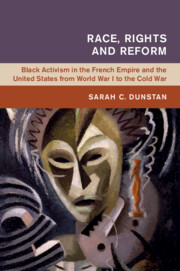 Race, Rights and Reform
Race, Rights and Reform Published online by Cambridge University Press: 01 March 2021
Chapter 5 is an investigation into the way that black intellectuals understood the War and continued to struggle for the realization of the promises of republican democracy in its immediate aftermath. Black Americans such as Langston Hughes and W. E. B Du Bois saw many parallels between the racism of Hitler’s National Socialism and the racism of empire and Jim Crow segregation. So too did thinkers such as the French-Guyanese poet Leon Gontran-Damas and the Martinican poet-turned-politician, Aimé Césaire, understand fascism as a product of the same thinking that spurred France’s so-called mission civilisatrice. Drawing on publications in journals, personal correspondence and the United Nations archives, this chapter argues that these black intellectuals increasingly conceived of freedom not just in terms of political liberation but of liberty from the sense of cultural and intellectual inferiority created by fascism, imperialism and racism. Allied Victory in the Second World War and the foundation of the United Nations upon seemingly anti-imperial and anti-racist lines appeared to provide an opening for the transformation of the West toward such a formulation of liberty.
To save this book to your Kindle, first ensure [email protected] is added to your Approved Personal Document E-mail List under your Personal Document Settings on the Manage Your Content and Devices page of your Amazon account. Then enter the ‘name’ part of your Kindle email address below. Find out more about saving to your Kindle.
Note you can select to save to either the @free.kindle.com or @kindle.com variations. ‘@free.kindle.com’ emails are free but can only be saved to your device when it is connected to wi-fi. ‘@kindle.com’ emails can be delivered even when you are not connected to wi-fi, but note that service fees apply.
Find out more about the Kindle Personal Document Service.
To save content items to your account, please confirm that you agree to abide by our usage policies. If this is the first time you use this feature, you will be asked to authorise Cambridge Core to connect with your account. Find out more about saving content to Dropbox.
To save content items to your account, please confirm that you agree to abide by our usage policies. If this is the first time you use this feature, you will be asked to authorise Cambridge Core to connect with your account. Find out more about saving content to Google Drive.